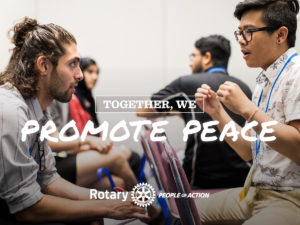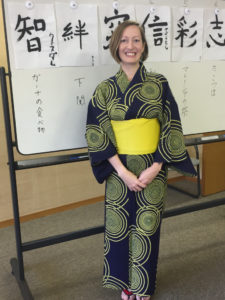Many clubs finish their meetings with the toast 'Rotary and Peace the World over'
The members don't think twice about it but they should. It isn't an idle wish, but a vision that our organisation really can make happen.
In 1940 the world was at war.
Paul Harris, founder of Rotary quotes in The Rotarian magazine that February:
“Must the best genius of men be devoted to the science of war and none to the science of averting it?”
The Second World War began to clarify views within our organisation that we could and should strive to make our world a far more peaceful place.
After the war, The United Nations were formed. Around 100 Rotarians were deeply and fundamentally involved at senior levels in the formation of the most famous of all Organisations for Peace. Many people, even Rotarians, don't realise that Rotary has such an incredible history of ground breaking work in this field.
The Rotary Foundation is our charity. Its vision is-
"Enabling Rotarians to Advance World Understanding, Goodwill and Peace."
It has three key elements to its mission:
1. Improving Health
2. Supporting Education
3. Alleviating poverty.
Those of you up to date with current accepted theories on Global Security will know that these also happen to be (if you now add Climate Change), the key issues we need to address if we our World has any chance of remaining a peaceful one.
So, the ultimate aim of our charity is the promotion of World Peace.
You cannot get a more ambitious goal than that.
In 1996 rotary began to investigate an educational institution dedicated to Paul Harris a Rotary University. This dream was found to be unrealisable, but in 1999 an alternative was found and $5.3M over a six-year trial invested in it.
This alternative was the Rotary Centres in Peace & Conflict Resolution 5 Universities around the world (over 100 applied for the honour) where mid-career professionals in this specialism could study, supported by a Fellowship from RI.
These Centres are in the US, Sweden, Australia, Japan and the UK in Bradford specifically and we're proud that our Centre is the best in the world.
Each centre takes up to twelve Fellows each year. But why? The aim is to help individuals with experience, vision, drive and with values in line with Rotary itself to develop into 'change agents for peace' in the world. They are selected on a worldwide basis through a rigorous process by expert panels. It's a tough challenge to be selected for the 18 month mostly academic partly practical course.
Once graduated, in ten or twenty years these people will be in the prime of their careers in senior positions in global agencies. One may even be in a position to do the 'right thing at the right time' on a global stage and save the world from war and help bring peace. Even if that never happens there is no doubt that wherever their career takes them they will do good whether in a war zone, an inner city, with kids or with leaders, they will make a difference.
Over 800 have graduated. They come from incredibly varied backgrounds race, creed, country - and are working all over the world, wherever their skills are needed. These are wonderful, courageous people we are proud to be associated with.
This is a superb programme and in global RI terms second only to End Polio.
The programme is currently supported from the World Fund so unlike ambassadorial scholars, no money comes from our district.
The current aim is to create an endowment to support the program in perpetuity.
District Sponsored Lorraine Hayman
Lorraine Hayman, who is studying at the International Christian University in Tokyo (one of the Rotary Peace Centres,) writes:
“I was just reading about the student accommodation lockdowns in Manchester…half the world away the same thing is happening here. To try and combat students blatantly ignoring physical distancing measures the ICU administration sent out several very firm emails to students living on campus asking them to be more responsible and telling them off for not being. Still, I am not too sure what anyone expects though when you get groups of 18 years olds living together without parental supervision! It is not great news for the cities / local areas Universities are in and it is a shame that everyone isn’t being responsible in equal measure.”
Lorraine, known as Lorrie, has written an extensive report of her thoughts about peace and her experiences on her Masters is more about the academic side of her scholarship.
We also interviewed Lorrie for more of her personal story:
“I’m a Devonian but with longstanding contacts in the North. I studied history with dance at Liverpool Hope University and then taught history and politics in Manchester and Yorkshire.
“My time so far in Japan has been very extraordinary – I was in rural Japan for a while, but now I am on campus in Tokyo. I am keeping a very good eye on Covid, we haven’t had an outbreak but if it happens my husband and I may be asked to go off campus and I have no idea what we would do – we don’t have family to go to, of course.
“The infection has not followed similar patterns to other countries – in March the incidence was very high and especially over the Summer. There were 2-400 infections a day out of a Greater Tokyo population of 14 million. That was a similar figure to the daily rate in the UK, with more than 4 times greater population! So it’s high and it’s scary.
“Interestingly the death rate is considerably lower – it’s unclear why. There is an ageing population but also with very low obesity. Lockdown is recommended but not legally enforceable in the way it is at home. But you rarely see anyone without a mask in public. I was walking near a waterway and a man fishing alone still had his face mask on! We were the only two people in sight!
“For students in Japan it is a time of freedom so they are not so well behaved. They go from being hard-working school kids to Salaryman – this is the only time they get to be themselves. Sports clubs are a big deal here – everyone has to do one activity that is not part of class. So people started gathering. The Administration Department has been frustrated by trying to keep control and also there are many staff on campus.
“In the future I want to do PhD looking at “digital divides” – whether people have equal access and power over skills and access to technology, especially regarding sexual violence online. Issues of class, race, sex.
“Meanwhile I was speaking to a friend in England and we both agree: we have to keep living, we have to take care but keep doing the things that are important to us and live …our best life!”
An opportunity to find out more:The Rotary Peace Centre - Faculty of Management, Law and Social Sciences - University of BradfordPeace Fellowships | Rotary International
